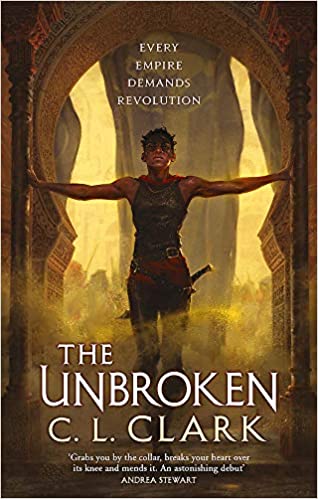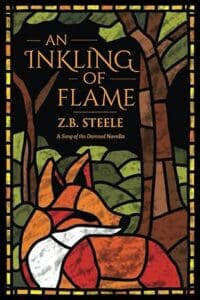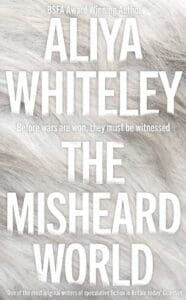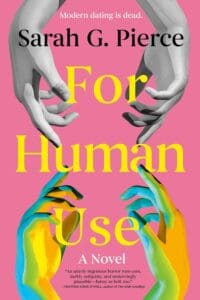Rating: 10/10
Synopsis:
Touraine is a soldier. Stolen as a child and raised to kill and die for the empire, her only loyalty is to her fellow conscripts. But now, her company has been sent back to her homeland to stop a rebellion, and the ties of blood may be stronger than she thought.
Luca needs a turncoat. Someone desperate enough to tiptoe the bayonet’s edge between treason and orders. Someone who can sway the rebels toward peace, while Luca focuses on what really matters: getting her uncle off her throne.
Through assassinations and massacres, in bedrooms and war rooms, Touraine and Luca will haggle over the price of a nation. But some things aren’t for sale.
Review:
Thank you to Nazia, Orbit Books, for providing me an ARC to review this book. All opinions are just that, my opinion.
This review contains minor spoilers so you read at your own risk.
This is a gut-wrenching debut full of stories long forgotten. That have been buried under the sands. You will witness stories of betrayal, characters being forced to do actions they don’t like, characters that have a strong sense of loyalty to their families. That dear reader, is what this story tells you. A wonderful yet tragic tale at the same time. It is a story that exposes the brutality of colonialism and oppression bringing the harsh reality of life under colonial rule in over five hundred pages is not only just a glimpse, just a viewpoint. No. It is an achievement. I am so impressed with the way this novel has been written. It takes a lot of time, though, and process to not only understand what was the motives behind colonialism but to also illustrate this with magic, gods and so many cultural influences from the Berbers to the Algerians, to Arabian style tribes and I could hint a detection of Ancient Egyptian influences. This is a novel in 2021 that has to be read. I am telling you, the amount of betrayal and trickery one has to go through to read this novel, to witness the characters Touraine and Luca embark on a journey of self-discovery, hurt, and pain to finally realize that all of this conflict, is in the end for nothing.
I studied French Colonial History and I especially studied Algeria during that time. So from one student of this subject to another, I applaud you, C.L Clark. You’ve done your work. You’ve done your research. You’ve shown the rich culture that North Africa has had on the European World which has been often ignored. Carthage had a massive influence when it ruled Spain and North Africa until it came to war with the Roman Republic. Then came the Numidians who had helped the Romans against Hannibal, only to find that their payment for their loyalty was their destruction. Then came the Roman rule of North Africa for centuries until the break up of the Western and Eastern Roman Empires and the arrival of Islam into North Africa, which then included the Maghreb and which the Ottoman Admiral, Piri Res would establish his mark over there, and then, of course, the Barbary Pirates, the Ottoman Empire’s influence. This amount of history in itself is to draw attention to the fact that I could draw many comparisons too. But North Africa is a perfect setting for fantasy and I am so glad C.L Clark chose French North Africa as a subject on to base her fantasy. (Plus she’s studied the subject so kudos. Well done). French Colonial Rule is a conundrum in and by itself in many aspects. On the one hand, they did for some time agreed to listen to their colonial subjects, but then took those concerns away, and established the main axis of power within the French settlers that were outnumbered by their Algerian/Vietnamese native populations. The Balladarians are pretty much like that, in many senses. They take all the best positions, shops, merchants you name it. The Qazali don’t get much for it in return. It’s a pretty raw deal if you ask me.
Do you want to see how this all works? Let me summarise it in a way that will keep track of the world events to not spoil the whole story. Touraine was a child that lived in the Shalan Empire. The Balladarian Empire comes in and conquers it. Now Touraine arrives back into her native lands, as a part of a regiment called the Sands. The Sands, however, are just cannon fodder. They’re just there to be sent into battle with no consideration. They are educated in the Balladarian way yes, they may talk and speak like Balladarians, but they are not true Balladarians. The Balladarians don’t see them that way. Especially General Cantic. And boy, is she the most difficult character in this book. A woman that is suited for power, I don’t think she even needed to be in this land. She needed to be back in Balladaria securing power for herself. That is what I felt. She is supremely one of the most brilliant grey characters you will come across in this book. Difficult to deal with. But then again, she’s leading one of the most dizzying experiences. She has to deal with riots, rebellions, and deal with the usurpation of power. But she’s exactly the type of general that if I were an Emperor, I would not want her to be my enemy. She is, of course, having tendencies of disloyalty. And too much loyalty can be bad sometimes now, can’t it?
The Balladarians, considering themselves so civilized and think that their architecture is so superior compared to the ‘mud-brick’ architecture that the people of Qazali prefer, that they export marble architecture into the lands of the Qazali. I wonder then, how popular it is. It won’t be. Revolts are brewing in the Shalan Empire’s former colonies. The Balladarians, being as arrogant as ever, refuse to see that their brutal rule is causing the Qazali to form rebellions, striking at their resources, using animals, they are wanting the Balladarians out. Now that’s not a secret in and by itself, the blurb itself tells you that. The Balladarians are in my opinion, the barrier to progress. They are in effect, just like the Ptolemaic Kingdom of Egypt. How? Well when Ptolemy and the Greeks settled in Alexandria and established their new Kingdom, they saw Ancient Egyptians as inferior. They had segregated streets from the Ancient Egyptians, and the Ancient Egyptians lamented, calling upon the fact that they had four thousand years of history. Yet that was all being ignored. I have no doubt the Qazali are feeling the same. And they may call friends from certain places….(One which you’ll be able to figure out!)
Bear in mind, this is a slow-paced military fantasy novel. Once it gets going, its pace is well structured. However, there were some scenes that I felt could have been cut out as it was dragging the story arc sometimes a little too off-tangent. Some scenes could have been shortened when it came to some military battles and more emphasis should have been on twists in my opinion. There are many elements of the novel where you’ll have this fantastic battle scene, or finding out what’s behind XYZ, but then it’ll have other scenes that sometimes could have been used in other areas. Mostly the pacing is fine, but I felt some scenes could have been shortened a bit. There’s a lot of mythology regarding the Qazali and their neighbours. But I felt all of that amazing mythology that is reiterated during this novel could easily be a standalone novel. Easily. There’s so much tantalizing mythology that I would read a standalone novel. That’s where this minor criticism is coming from.
Rogan reminds me of the brutal officers that were sent to the colonies. I remember reading a part in a historical academic book that discussed French colonial rule in Algeria. At one point the story goes that the French had to deal with rebellions. One particular rebellious group ran into the mountains. The Captain ordered the troops to burn the rebels, all of them including families inside a cave. That is how history is sometimes. The Ancient Romans for that matter would have been destroying rebels in North Africa plenty of times, including the Numidians. But I do not see why Rogan would not do the same to the Qazali rebels. He is a dangerous man. Rogan however, needed more emphasis. I wonder what role he will play coming in the sequel.
Touraine is eager to show her loyalty to the Balladarian Empire. That much is evident and is the core focus of Luca’s and Touraine’s chemistry together. However, I compare Touraine’s plight to the other soldiers of the Sands regiment. They are like the Senegalese troops of WWII that were conscripted by France to fight in WWII. They fought with distinction and were in the thick of the fighting during the Battle of France against Germany. However, after the war, they were promised full citizenship and equal rights. Something which took a long time for the French Government to even acknowledge. The concept of citizenship will come up somewhere in this novel. You’ll soon see why. Luca is also acquiring her form of power, her motive to prove that she is worthy to inherit the throne of Balladaria. But of course, gaining power in an empire where a den of snakes infests the political landscape is like a lizard trying to escape that den of snakes before it gets swallowed. Luca is that lizard. She will have to comprehend with more than just people, she’ll have to comprehend with forces beyond her imagination that will test the romantic chemistry of Luca and Touraine’s relationship.
Touraine and Luca’s chemistry are a slow burn but probably for deliberate reasons – to introduce the world that is there. The politics and situation that the story puts on both characters make the romance more realistic, but at the same time, it does show signs of some under-development that could have been improved in pacing areas for that time. But the politics of power proves a mighty strain on both of them, on the personality of their character, and it eventually stems down to this: Touraine and Luca are good people. They want to do good. But the way Colonialism works doesn’t allow good people into its system. Because colonialism was built on the exploitation of other people, and then when good people do come, the system chews it up. Does this refer to all elements of colonialism to be equally worse than the other? Not exactly. Some parts of colonialism did benefit the local natives that betrayed themselves to the foreign powers. Some parts of colonialism had people benefiting from advanced technology. Remember I’m putting a very vague bracket here. I have an Indian background, so of course, I could go and talk about the impact of British rule in India. But that’s not the point. The point is that this novel is showing what colonialism forces people to become: something entirely else.
We could refer to the Ancient World for that matter. What about Parthian Princes that were sent by the Parthian Kings as a sort of exchange to Rome. They were Roman educated and had been brought up in Roman Culture. Then I ask you this. Did they not feel conflicted when it came to proving their loyalty to Rome or Parthia? Did they not go through the same questions that Touraine is forced to go through? This has been happening all the time throughout human history. During the Sengoku Jidai, which was Japan’s massive and brutal civil war in which medieval warlords known as Daimyos would exchange their sons as hostages to each other’s clan. Same thing. Or let’s look at Bernadotte. Marshal Bernadotte is a famous figure in French history. He was the man that Napoleon valued as a General, but often was insubordinate and refused to follow orders.
At one point he was offered the crown of Sweden which has led to the established dynasty of Sweden that is ongoing till today. Moving back to the point, when Napoleon invaded Russia in 1812 to punish Russia and achieve a decisive victory (he was taking the biggest gamble that cost him his empire because of his campaign), Bernadotte made Sweden successful, to say the least. He didn’t like Napoleon’s Continental system, and he had good relations with the Russian Tsar Alexander, during the invasion. Long story short: Bernadotte betrayed Napoleon after the 1812 campaign joining in the Sixth Coalition against Napoleon. Bernadotte taught the allies how to defeat Napoleon. This is just an instance of many outcomes of history where betraying the other side changes the entire outcome of events. It is hard, it is personal, and it is not a pleasant experience to go with when betrayal happens. Many of these historical parallels I’ve just made now relate in some form of manner of the events that will happen within this book. Not a direct comparison, but inspired.
So when you read this book, keep these events in mind. There are many good characters: The evil but cunning Beau-Sang who is a horrible man. The bully of a bully, Captain Rogan who I think needed more character development. Touraine’s mother, Jaghotai whom I didn’t like at all and didn’t agree with her reasoning over her daughter. Djasha and Jaghotai’s wife, were really good characters. The bookseller was awesome. This world is alive. I’ll tell you that. You’ll have Qazali people dancing, drummers drumming the drums, music being played, bread and olives being eaten. A clear distinction is shown between the people of the Qazali and the Balladarians and their neighbors. You’ll figure out which is which, what is what, and how and why everything happens.
Just know that I’m on the side of Touraine, and that I felt Luca’s manipulative chances of forming chemistry with Touraine, to use her as a weapon, as a bridge between Balladarian and Qazali leads to some very interesting outcomes. The writing is so well researched that I feel I’m in a different world many times. I feel as if I’m in the lands of Qazali. There are breath-taking descriptions of Grand Temples, of musket warfare. I think I might have missed a cannon here or there. Every Empire demands a revolution yes? Well, this novel calls for an entire evolution of the outdated concepts that the Balladarians carry about the Qazali, and it demands an entire revolution for the Qazali to remove these Balladarians. Then, of course, not one side is evil nor is bad. That’s what the novel will make you think. The narrator is a very clever character by itself. It makes you feel for each character, it convinces you that one side is right. But I said. Hold on. Not everybody is perfect. Human makes mistakes. We all do. Colonialism is a study of the past. Human history is dark.
But sometimes, we can see the bright spots. Sometimes, hope does come. Anyway, all my historical thoughts are just that, an opinion. Nothing more. I don’t claim to be historically accurate in my review. I’m just drawing parallels to certain moments of history that I’ve read and compared this novel to. This is very much like a Desolation of Peace. In very many senses it is. Also, it is a fantastic novel. Amazing and well-researched writing and the world is alive. I already want a Netflix adaptation of this book. You’ve done an amazing job. C.L. Clark. Fantastic work. The fact you’ve manged to get this student of history draw so many historical parallels is amazing. But the major fact is, you’ve given me a new fantasy world that isn’t medieval Europe and while I do enjoy reading it, this feels like a fresh, new unique world. I can’t wait to read book 2!
It’s a 10/10 from me.





Leave a Reply